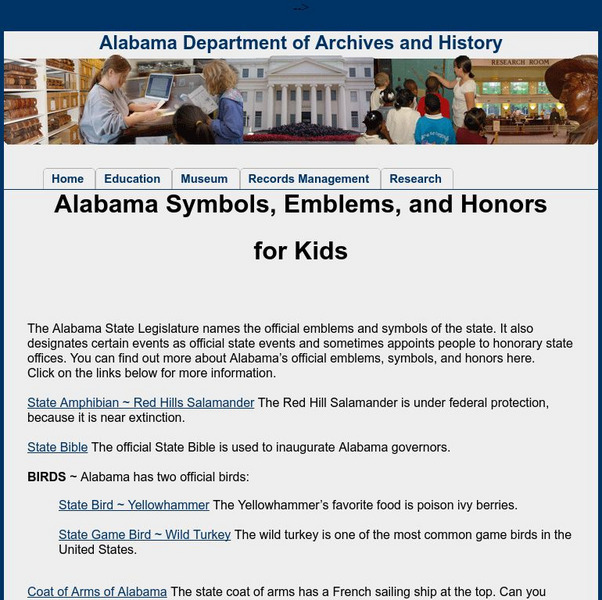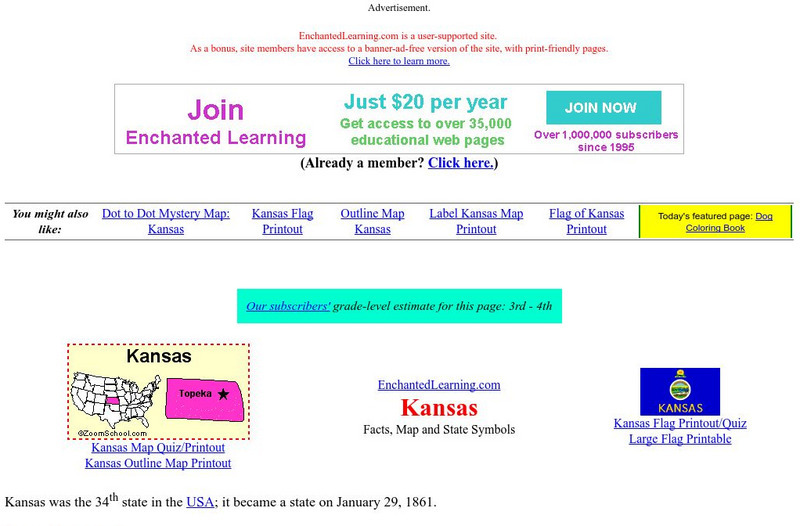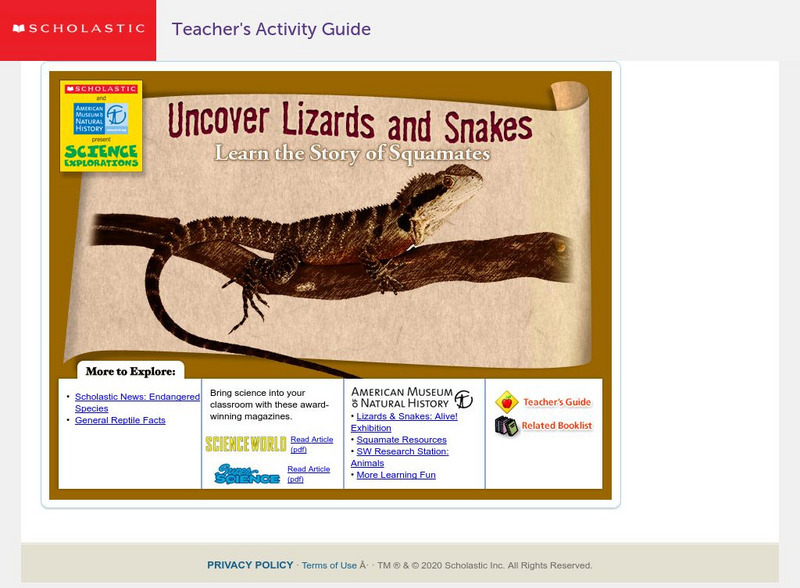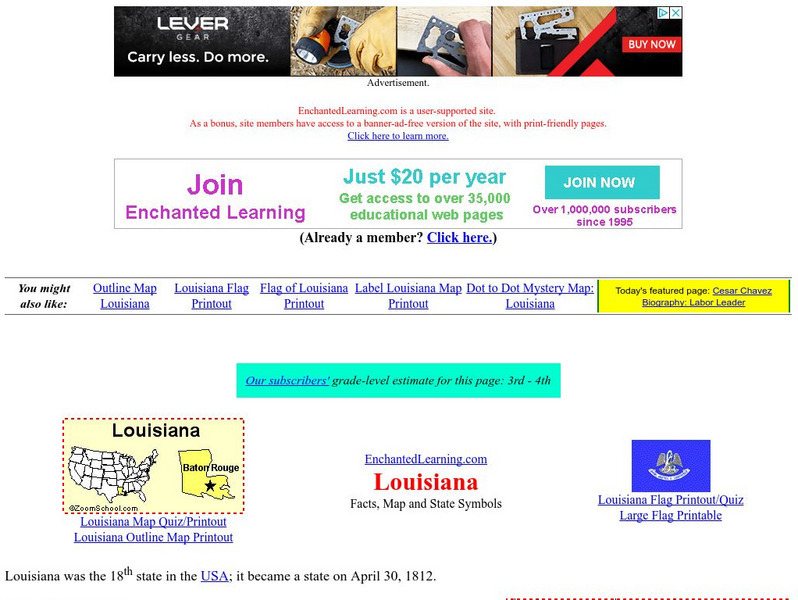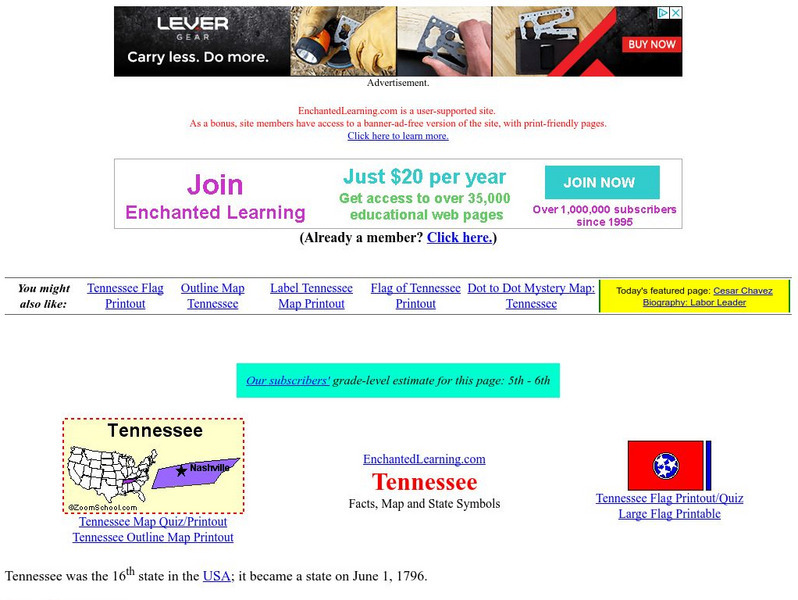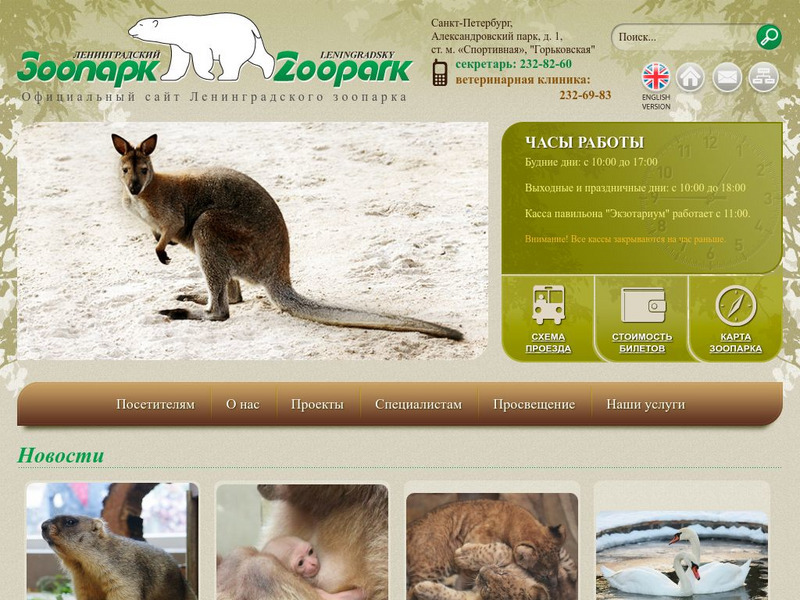Hi, what do you want to do?
Georgia Department of Education
Ga Virtual Learning: Earth and Life History
In this amazingly comprehensive tutorial you will learn about the geological and environmental changes that occurred during the geologic time scale.
Other
Alabama Emblems, Symbols and Honors
A list of all of the state emblems and symbols for the state of Alabama. Clicking on the underlined link will bring up a picture of the symbol or emblem.
Other
Sc Reptiles & Amphibians: Eastern & Florida Cottonmouth
South Carolina Reptiles & Amphibians profiles the eastern cottonmouth. A great site for photos-- both the eastern and Florida cottonmouth are pictured.
Other
Reptiles and Amphibians of the Uk: Grass Snake
The most common species in the UK, the Grass Snake is identified by the Reptiles and Amphibians of the UK website. Detailed description and photos included.
Other
Asp Viper
A series of color photos of the Asp Viper from Amphibians and Reptiles of Europe. Link to related species photos.
Curated OER
National Park Service: Arches National Park: Animals
A resource where you'll learn about amphibians, birds, mammals, and reptiles at Arches National Park in Moab, Utah. A good look at how animals live, sleep, eat, and stay active in a desert habitat.
ClassFlow
Class Flow: Reptiles and Amphibians
[Free Registration/Login Required] This flipchart provides basic information for the characteristics of reptiles and amphibian and life cycles. Videos show reptiles and amphibians that can cruise through the air, and an alligator mom...
Enchanted Learning
Enchanted Learning: Kansas Facts, Map and State Symbols
A colorful site with basic information about Kansas. Includes a map, facts about the state, and information about the state symbols.
Other
Reptiles and Amphibians of the Uk: Natterjack Toad Bufo Calamita
A list of identifying features of the Natterjack Toad, and a description of its habitat and breeding.
NSTATE
New Mexico State Symbols and Emblems
Which state has a balloon museum and a hot air balloon for an aircraft symbol? New Mexico, of course! Find out all about their state symbols and emblems here. Click on the word for more information and a picture.
CK-12 Foundation
Ck 12: Third Grade Science: Life Sci: Animal Characteristics and Classification
[Free Registration/Login may be required to access all resource tools.] Presents an overview of the major animals groups (mammals, birds, reptiles, amphibians, fish, arthropods, vertebrates, invertebrates, those having live births and...
Scholastic
Scholastic: Science Explorations: Uncover Lizards and Snakes
An exploration of squamates, or scaled reptiles. Take notes about lizards and snakes using the pdf "Squamate Chart" while viewing a slideshow, investigate the squamate anatomy and how squamates differ from other animals, such as insects...
Smithsonian Institution
Smithsonian National Zoo
Here is the National Zoological Park right at our fingertips. Students will find many things to explore at this colorful and engaging site. Any study of animals will have a successful start here. Chances are students can catch their...
University of Illinois
University of Illinois Urbana Champaign: About Antarctica: Plate Tectonics
Explanation of why Antarctica has fossils of ferns, amphibians, and reptiles. Gondwanaland is discussed and shown in an interactive map.
ClassFlow
Class Flow: Animals Grow and Change
[Free Registration/Login Required] This is a 2nd Grade unit on how animals grow and change. It includes information on life cycles of animals and how to classify animals into groups (i.e. mammal, reptile, amphibian, etc.) There is an...
University of Florida
Florida Museum of Natural History: Homepage
This site from the Florida Museum of Natural History gives the current events, information about the museum, exhibits and public programs, research and collections, links, etc. to the Florida Museum of Natural History.
ClassFlow
Class Flow: Vertebrates and Invertebrates
[Free Registration/Login Required] Using this lesson the students will review the 2 groups of animals - vertebrates and invertebrates. They will be actively involved in classifying animals. An Activote assessment is also included.
ClassFlow
Class Flow: Animal Classification
[Free Registration/Login Required] This is a flipchart for first graders to learn about mammals, fish, birds, amphibians and reptiles.
Other
Florida Department of Environmental Protection: Life in a Spring
Learn all about the diverse species that live in the Florida Springs. Separate sections for fish, reptiles and amphibians, birds and mammals, insects and invertebrates, and plants.
Utah Education Network
Uen: Science Vocabulary Game
Fourth graders will play a review memory game with Utah's Grade 4 Science Standard V vocabulary words during this lesson. Words associated with living things and classifications of living things are included in this lesson.
Enchanted Learning
Enchanted Learning: Louisiana
This site has a colorful display of information about Louisiana. It contains a map, pictures, a list of state symbols, and links to related information.
Enchanted Learning
Enchanted Learning: Tennessee
This site has a colorful display of information about Tennessee. It contains a map, pictures, a list of state symbols, and links to related information.
Other
Leningrad Zoo (Official Site)
Russian content! Gives detailed information about groups of animals such as mammals, birds, reptiles, and amphibians. Also contains many photographs of animals as well as links to other Russian and world zoos. In addition, it offers...
Canadian Wildlife Federation
Hinterland Who's Who: Coho Salmon
Get the facts about coho salmon. Besides finding a detailed description of this fish that calls the Interior Fraser River watershed home, you?ll also learn about some of its unique facts and characteristics. Also included in this Fish...
Other popular searches
- Reptiles and Amphibians
- Amphibians and Reptiles K 2
- Amphibians and Reptiles K
- Amphibians and Reptiles Prek
- Amphibians and Reptiles Unit
- Amphibians and Reptiles Perk
- Amphibians and Reptiles 3 5






